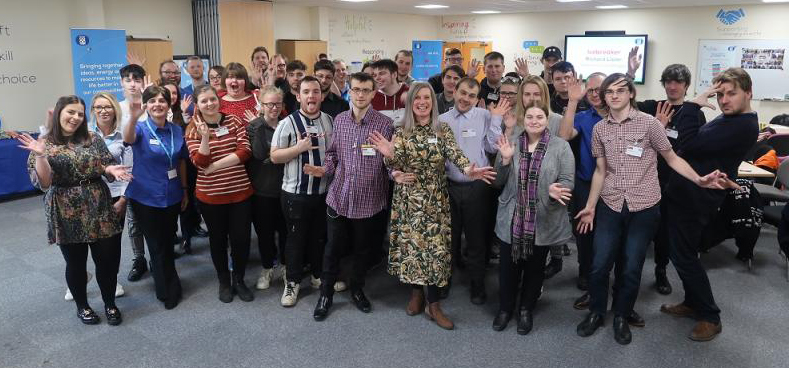Retail provides more jobs in the UK than any other private sector – and it is also the largest part of the co-operative economy, with a combined turnover of £28.5bn and a workforce of around 100,000.
Retail accounts for 10% of all jobs in the UK – yet the industry faces a significant challenge with around 125,000 vacancies yet to be filled, warns a report from the Association of Convenience Stores, on behalf of the Retail Sector Council.
Alongside a need for innovative recruitment strategies, colleague wellbeing is a priority for co-ops and other retailers, says the Retail – Employment Opportunities for Everyone report. One strand of this is providing career opportunities for people who would otherwise be excluded from the job market – including older people and career returners, refugees, prison leavers, disabled people, care leavers and ex-armed forces personnel.
The report outlines how leading high street and online retailers are partnering with other organisations to promote the recruitment of these groups. Four co-ops – Lincolnshire, Midcounties, Central and Bright Future – and the employee-trust controlled John Lewis Partnership are among those featured in the report for their efforts to drive fairer recruitment.
“Retail remains an exciting and innovative industry to work in and this report highlights the diverse pool of talent which exists right across the industry,” says Helen Dickinson, CEO of the British Retail Consortium.
But the industry can’t rest on its laurels, she warns. “We must go further and faster on our drive to be the most inclusive industry we can – identifying and breaking down barriers which prevent talented individuals from getting involved.”
Related: How can co-ops offer a better future of work?
One co-op breaking down the barriers is Bright Future, originally formed through a partnership between Causeway charity and the Co-op Group in 2017 as a way to fast-track survivors of exploitation and forced labour into stable, high-quality employment.
The report tells the story of Aisha, who was rescued from seven years of forced labour and abuse. Her work experience and subsequent job as a Co-op Group customer assistant gave her financial independence and a welcoming community where she formed lasting friendships, boosting her recovery and self-esteem.
Bright Future has 35 organisations collaborating as members – including four retail co-ops: Co-op Group, Midcounties, East of England and Heart of England. They offer placements and stable employment, giving survivors financial freedom, a sense of community and control of their lives.
“We’re proud to support Bright Future Co-operative – through membership, having colleagues on their board and offering employment opportunities across our trading business,” says Phil Ponsonby, CEO of Midcounties, whose Fairer Futures programme is also featured in the report.
Fairer Futures is a partnership with social enterprise Miss Macaroon to empower vulnerable young people and deliver social value for local communities, using one of the society’s stores as the training base and community hub.
Related: UK retail co-op sector results for 2023
“We started Fairer Futures in April 2023 and in our first year have supported 23 young people with complex needs, with 19 trainees securing employment,” says Ponsonby, adding that the organisation is engaging with other local employers to provide even more employment opportunities for graduates of the programme.
“With youth unemployment rising and too many people not being given the chance to thrive, the co-op movement can play a leading role in breaking down barriers and creating opportunities for all,” he says. “That’s why it’s heartening to see so many examples in this report of co-ops finding new ways of making a positive impact.”

Lincolnshire CEO Alison Hands agrees. “Providing a wide range of employment opportunities is important to us as we’re here to make life better in our communities. One of the ways we can do that is to offer skills development and learning opportunities to our communities, enabling people to find employment with us or other businesses – boosting the local economy.”
The society is building on the achievements of its Get Into Retail scheme by offering work experience and training to participants in the government’s Restart scheme via Jobs 22.
“We have supported almost 100 people through this programme, and have employed 21 colleagues through this route,” says Hands. “Our travel and pharmacy teams also work with Speakers for Schools and deliver virtual work experience sessions to students, aiming to inspire their future career choices. We are also developing placement opportunities alongside the University of Lincoln.”
Central is another co-op that is “passionate about being the best place for people in our local communities to grow their careers”, says CEO Debbie Robinson, who notes that over 90% of colleagues in leadership positions at Central were promoted to their roles internally.
“Through our Difference Maker Academy, we offer opportunities that enable colleagues to explore a career with us guided by our co-op principles of self-help, self-responsibility, equality and equity, whether that’s through work experience, our apprenticeship programme, our debt-free degrees or through our career path and development programme.”
Robinson believes that offering employment opportunities for all “supports our belief that a diverse workforce enriches us as society and as a business. Different backgrounds, experiences and ways of thinking bring true value on a personal and organisational level.”
Central recently launched its Co-op Generation card for under 16s and has pledged to offer 300 work experience placements and support a further 1,500 students in employability workshops, where local store managers will work with local schools and colleges through the “adopt a school” programme.

“Our aim is to impact as many people as we can,” adds Robinson, “so our work experience opportunities are available throughout the year for students in years 10 and 11, those on college or university courses and for adults wanting to retrain in our food stores, funeral homes or at our support centre in Lichfield.”
Central has also been working with the Co-op Group to align its apprenticeship programmes and providers, and has had conversations with Midcounties to explore the Fairer Futures programme.
“[Retail] is a business founded on mutual respect for colleagues and customers, welcoming everyone regardless of their background, wealth, or ethnicity, and accepting everyone’s beliefs and preferences,” says James Lowman, CEO of the Association of Convenience Stores.
“Diversity, Equity and Inclusion transcend mere chapters in annual reports or annual board agenda items; they represent a deeply ingrained culture within every successful retail business.
“My hope is that this report inspires more retailers to explore these opportunities, enables more people to find jobs and skills, but also enriches the lives of colleagues and customers, elevating our engagement with under-utilised groups to another level.”
Main picture: Midcounties celebrates its Fairer Futures partnership with Miss Macaroon

